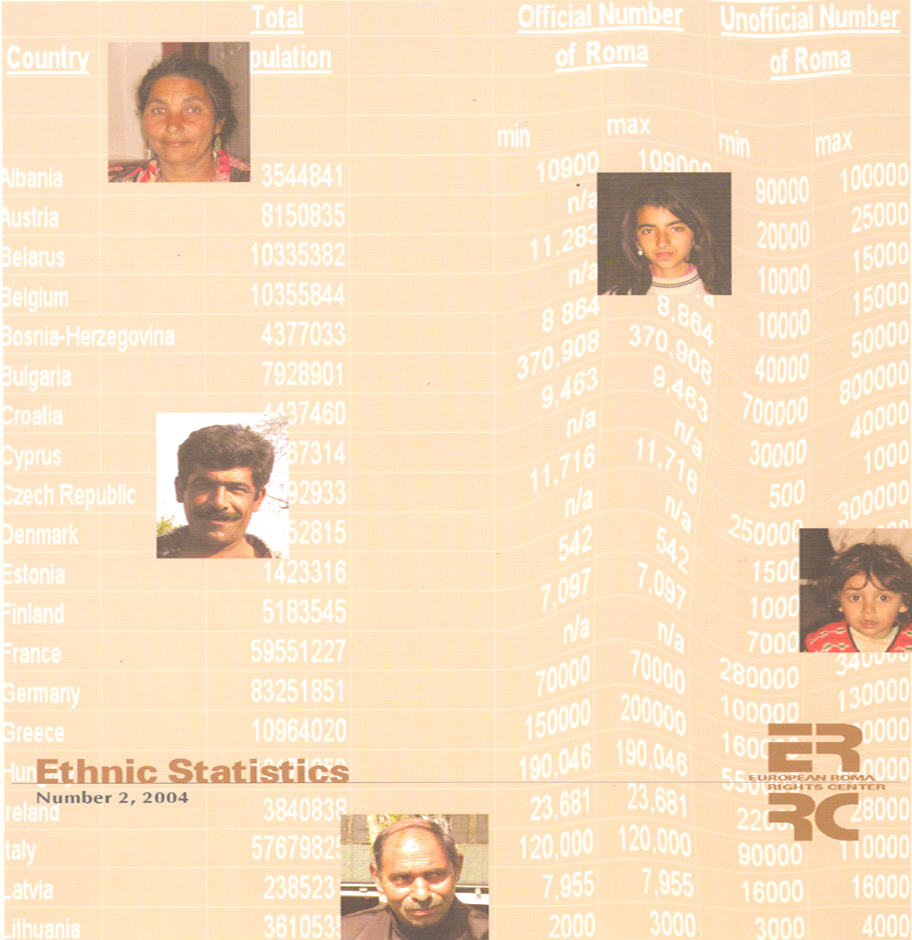Roma Rights 2, 2004: Ethnic Statistics
29 July 2004
 Roma Rights 2/2004 takes as its theme "Ethnic Statistics". In 2004, the complaint that there are no reliable statistics on Roma has become trivial. So has the call on governments to collect them. Criticism and recommendations regarding this issue are coming from all quarters, including governments of countries with significant Romani populations. Over the last six-seven years, the European Roma Rights Center has been among the most consistent advocates of collecting ethnic data for purposes of fighting racism and discrimination and for drafting viable equality programmes. Our position has been initially developed in the context of implementing anti-discrimination law to benefit the members of the most disadvantaged groups in European societies. More recently, as part of accession obligations, governments of European Union candidate countries worked with the Employment and Social Affairs Directorate of the European Commission on Joint Inclusion Memoranda, to be followed by National Action Plans. In the process, the deficiency of reliable Roma-related statistics loomed large as a major obstacle to rights based policy of Roma inclusion. The ERRC addressed the issue in most of its advocacy interventions in this regard.
Roma Rights 2/2004 takes as its theme "Ethnic Statistics". In 2004, the complaint that there are no reliable statistics on Roma has become trivial. So has the call on governments to collect them. Criticism and recommendations regarding this issue are coming from all quarters, including governments of countries with significant Romani populations. Over the last six-seven years, the European Roma Rights Center has been among the most consistent advocates of collecting ethnic data for purposes of fighting racism and discrimination and for drafting viable equality programmes. Our position has been initially developed in the context of implementing anti-discrimination law to benefit the members of the most disadvantaged groups in European societies. More recently, as part of accession obligations, governments of European Union candidate countries worked with the Employment and Social Affairs Directorate of the European Commission on Joint Inclusion Memoranda, to be followed by National Action Plans. In the process, the deficiency of reliable Roma-related statistics loomed large as a major obstacle to rights based policy of Roma inclusion. The ERRC addressed the issue in most of its advocacy interventions in this regard.
This issue of Roma Rights revisits and recapitulates the theme of Roma statistics from several angles. Andrei Ivanov and Susanne Milcher present the UNDP experience in assessing the development needs of Roma in Eastern Europe. Ferenc Babusik reveals the dilemmas that Hungarian sociology has been trying to solve when collecting data on Roma. Lilla Farkas looks at the issue from the prism of international law, revealing the paradoxical epistemological situation of knowing while not knowing the numbers of Roma. Sasha Barton comments on the British practice of ethnic monitoring and presents grounds for optimism even as it transpires that Gypsies and Travellers in the UK have not benefitted from ethnic monitoring. Claude Cahn notes that the European Union has not yet provided meaningful guidance on ethnic statistics.
In addition, Roma Rights 2/2004 provides news and developments concerning the human rights situation of Roma in Europe, and details ongoing ERRC activities.
Roma Rights 2, 2004: Ethnic Statistics (PDF)
-
Ethnic Statistics (Dimitrina Petrova)
-
The United Nations Development Programme's Vulnerability Projects, Roma and Ethnic Data (Susanne Milcher and Andrey Ivanov)
-
Legitimacy, Statistics and Research Methodology - Who Is Romani in Hungary Today and What Are We (Not) Allowed to Know About Roma (Ferenc Babusik)
-
The Monkey That Does Not See (Lilla Farkas)
-
Ethnic Monitoring, Gypsies and Travellers (Sasha Barton)
-
Void at the Centre: (The Lack of) European Union Guidance on Ethnic Data (Claude Cahn)
-
No Compromise with the Universality of Human Rights (Interview with Anna Karamanou News Roundup)
-
Bosnia and Herzegovina * Bulgaria * Czech Republic * Denmark * Finland * Greece * Hungary * Italy * Kosovo * Macedonia * Romania * Russia * Serbia and Montenegro * Slovakia * Slovenia * United Kingdom * Ukraine
-
UN Committee against Torture Urges the Czech Republic to Investigate Alleged Coercive Sterilisation of Romani Women (Cristi Mihalache)
-
Romani Women Discuss Women's Rights Action (Larry Olomoofe)
-
Litigating Discrimination in Access to Health Care (Alan Anstead)
-
The Culture of Giving and Roma Charity (Leonid Raihman)
-
Stigmata: Segreguime Edukacia e Rromengi ande Centralo thaj Easto Europa
-
Romani Politics as a Profession (Rumyan Russinov)
-
Chronicle




